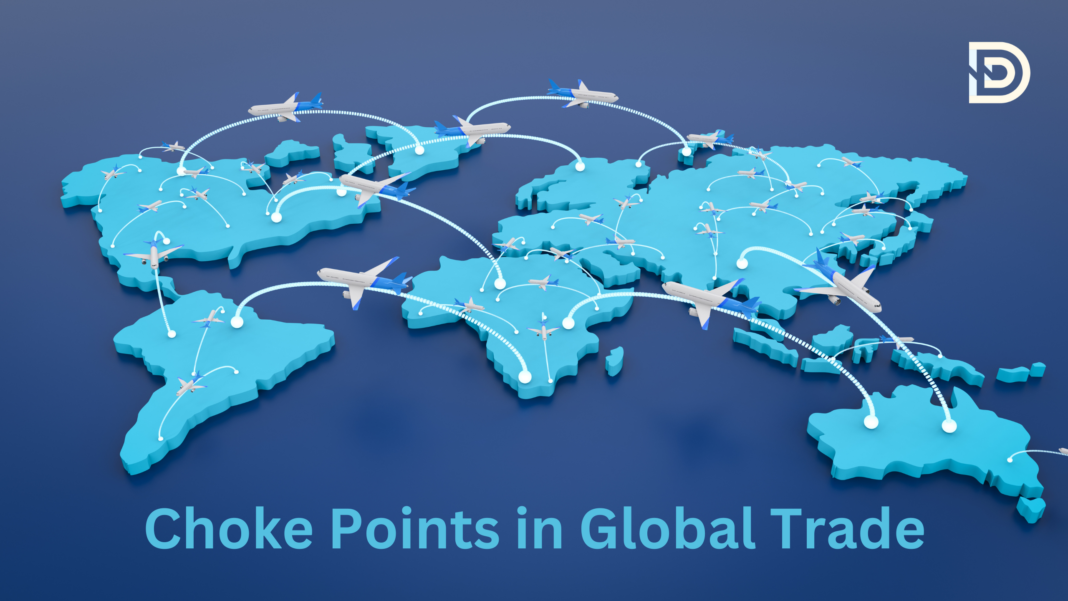Global trade is like a giant web connecting countries around the world. But this web has narrow passages called “chokepoints” that can easily get blocked, causing big problems for everyone.
Imagine you’re playing with marbles, rolling them through a funnel. The narrow part of the funnel is like a chokepoint. In global trade, chokepoints are narrow sea routes or canals where ships pass through to deliver goods. If something blocks these passages, many ships can’t get through, and that disrupts the flow of goods worldwide.
The Silent War at Sea
Global trade moves like an invisible current beneath our daily lives. Every product we buy, from food to electronics, has likely traveled across the ocean. But these shipments don’t move freely. They pass through narrow, strategic waterways known as chokepoints—places like the Suez Canal, the Panama Canal, and the Strait of Hormuz. These routes are essential, yet fragile. Controlling them means controlling global commerce.
For decades, the United States dominated these trade routes, ensuring safe passage for ships. However, that control is now slipping. China, Russia, and Iran have been slowly tightening their grip on these crucial passageways, using a mix of economic influence, military presence, and political pressure. The result? A silent war over the world’s supply chains.
The Chokepoints Crisis That Went Unnoticed
One of the first warning signs came in July 2024. A U.S.-flagged oil tanker, the M/V Overseas Santorini, stopped in Gibraltar for refueling. This was supposed to be a routine stop. Instead, the tanker was denied fuel, stranding it at sea. The UK government dismissed the issue, calling it a private company decision. But investigations later revealed that British lawmakers with a pro-Palestine stance had influenced the decision.
This wasn’t an isolated case. In Norway, another fuel company refused to service U.S.-affiliated ships in protest of President Trump’s policies. The difference? This time, the U.S. government pushed back immediately, forcing Norway to reverse its decision within hours.
Choke Points: Strategic Control of Global Trade and Security
These incidents are not just bureaucratic mishaps. They are deliberate moves to weaken American control over maritime trade. And they signal a shift in power—a shift where strategic chokepoints are being used as economic weapons.
The Weaponization of Chokepoints
Countries like China and Iran understand the power of chokepoints. Instead of outright military confrontations, they are quietly taking control of key ports, signing long-term agreements, and creating barriers for U.S. and allied ships.
- China has gained control over ports at both ends of the Panama Canal. This means that a nation hostile to the U.S. could block or delay shipments at will.
- The Red Sea, which connects Europe and Asia through the Suez Canal, is now heavily influenced by Chinese and Iranian military forces.
- The Strait of Hormuz, through which 20% of the world’s oil passes, is under constant threat from Iran.
Trump’s White House Ordered Pentagon to Develop Military Options for Panama Canal
At the same time, international organizations like the International Maritime Organization (IMO) are shaping regulations that favor Chinese interests, making it harder for U.S. shipping companies to operate freely.
For years, the U.S. believed that having the world’s strongest navy would be enough to protect trade. But without control over the shipping lanes themselves, naval power means little.
The Struggle for Global Trade Dominance
As these silent battles unfold, the U.S. has been slow to respond. Under past administrations, maritime security was treated as a low-priority issue. However, the Trump administration has taken a more aggressive stance, viewing the control of chokepoints as a matter of national security.
New policies are being drafted to restrict Chinese-built ships, enforce stricter trade regulations, and invest in U.S. shipbuilding. The Federal Maritime Commission (FMC) has also launched an investigation into how foreign countries are manipulating trade routes. This could lead to harsh penalties on nations that restrict U.S. shipping access.
The stakes are high. Chokepoints are no longer just geographic features—they are now weapons of economic warfare. And as more nations fight for control over these routes, global trade will continue to face increasing disruptions.

